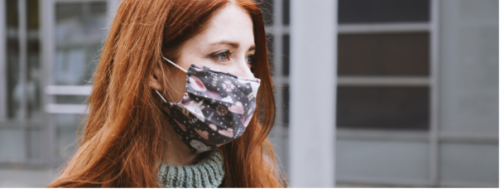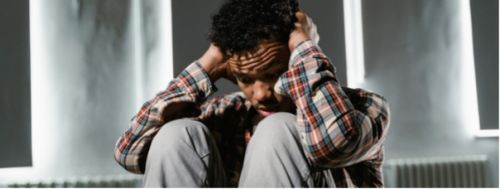Forced to navigate a world that was distinguished by fractured communication, a sea of obtrusive masks, social distancing, and spells of isolation – those with hearing loss have faced unique barriers and frustrations. Paul Harrison, of Hearing Aid UK, talks about how deaf and hard of hearing people have been challenged throughout the pandemic and beyond.

Unfamiliar Social Contexts
Before the pandemic wave hit, those with hearing loss faced daily challenges within their listening experiences; life could be a rollercoaster of emotions like isolation, anxiety and stress to overcome. COVID-19 only served to boost such existing hurdles – especially in social environments.
The reliance on non-verbal information resources was problematic as masks reduced speech recognition, speech cues and the ability to lip-read, and hid expressions. To put things into perspective, hearing and understanding are two separate things – just because someone with hearing loss can hear you, they don’t necessarily understand you.
Combining speech, sound and lip reading gives those with hearing loss a greater understanding of context within a conversation. Therefore, those with hearing loss were often left feeling more isolated as they took on new and unwanted anxieties like lack of confidence in social gatherings, work environments and even the commute to the office for some.
As for everyone else, life was different, and we needed to adapt to stay safe, keep some degree of normality, and accept that we might have to live with adaptations permanently. A couple of years on and we are still very aware of the virus’s unpredictability and are beginning to recognise the long-term impact it has had on the hard of hearing.
A new barrier for healthcare access
It wasn’t just lifestyles and daily routines that were affected – accessing personal healthcare took a hit – with uncompromising visiting restrictions and limited translation services. This has been a huge difficulty, as even hearing people are prone to feeling anxious and look to family members or friends to offer support and lessen the burden of healthcare appointments.
People with hearing loss were taken out of their comfort zone by navigating medical appointments with limited or no translation of medical advice and without family support. This was even more damaging when hard of hearing individuals had to be taken into hospital due to the virus – experiencing isolation challenges, problems with altering hearing aids to their new soundscape, and accessing translation devices.
“Those with hearing loss were overly challenged by social distancing, maintaining communication and connection with family, friends and work colleagues. In a time when everyone relied on the ability to hear people more than ever – the hard of hearing were affected the most. This meant increased levels of anxiety, social isolation, and other mental-health issues arose.
Research must be undertaken to focus on the long-term impact of the pandemic for individuals with hearing loss. Not just adults but also the younger generation who conformed to social distancing and remote learning often without their usual support and access to assistive tools. We need to protect, understand and learn from the reality of how they have been affected mentally and physically by restrictions for the future”
David Robert – Hearing Aid UK Audiologist

Isolation and the rise of remote working
We are still very much riding the wave of the pandemic and initial aftermath – so when we talk about remote working it is still relevant for people with hearing loss and remains the new norm for working today – take the hybrid concept, for example.
Although, I’m sure a huge number of businesses have adapted and attempted to cater for their employees who are hard of hearing, there remains some level of inaccessibility within remote working environments. This could be in the shape of limited interpretation services and struggles with adapting to digital communication like Zoom meetings. This has led to reduced access to speech sounds, which affects spoken language and paves the way to vulnerability, stress, digital and listening fatigue, and social anxiety in the future.
Fatigue took on a whole new meaning
During the pandemic we looked to digital platforms and tools where possible. This has taken its toll on most of us and now we are a nation experiencing various levels of listening and digital fatigue.
Those with hearing loss are daily challenged, so digital and listening fatigue hits them harder and faster; owing to them having less stimuli than those who have ‘normal’ hearing, the symptoms of this fatigue increase.
What have we learned?
COVID has also brought with it some opportunities. For example, how we as friends, family, employers, and a nation can include people from the deaf community; this could involve introducing vital inclusive policies like clear face masks, closed captioning, and speech-to-text assistive tools.
Audiologists have gone out of their comfort zone to focus on remote care and digital support to reach their patients. Some hearing aid manufacturers revisited their approach to supporting people with assistive technology in the new climate; they developed various remote care apps to provide support, remote adjustments, and a platform to connect wearers to their hearing healthcare professional.
The pandemic has instigated new technology and forced the audiology industry to adapt quickly and effectively for a group that is still being overlooked. These measures have made a difference and need to continue to inspire providers to lower the barriers to social support and communication.
We must now all play a part in ensuring that access increases and that deaf and hard of hearing people are supported according to their unique needs going forward, especially those with mental health concerns.
This article was written Paul Harrison, Audiology Expert and Founder of Hearing Aid UK.
For other articles contributed by Paul:
Looking for more support? We’ve made it our mission to improve the lives of deaf people everywhere. Check out Deaf Unity’s projects to find out what we can do for you. If you’d like to get in touch, contact us here.

